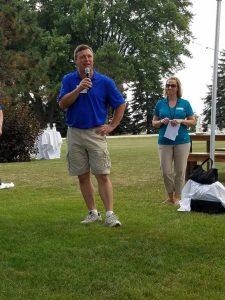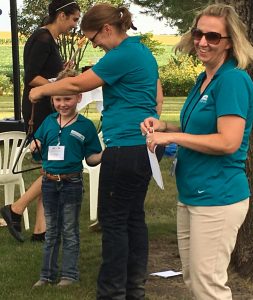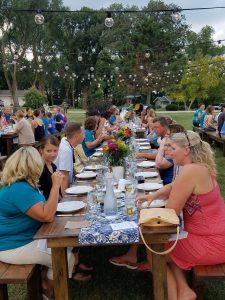Written by Jonathan Eisenthal

Brian Thalmann welcomes guests to his family farm for the Field to Fork farm dinner.
She came to the farm Tuesday night with a lot of appreciation for what farmers do, but also with some burning questions.
Barb Schank, the school nutrition director for Waconia Independent School District, feeds 4,000 kids every school day, and she wants to know what’s in the pork products her students eat.
Wanda Patsche, a corn and soybean farmer and a hog producer, volunteers for CommonGround Minnesota, just so she can answer questions like Barb has.
“No, it’s illegal for us to use hormones for our pigs,” Wanda told Barb. “It’s illegal to use them in poultry, too. We sell our pigs to Hormel, and USDA inspectors right there at the plant test for hormones and also, they test for antibiotics to show that there is zero residue in the animal.”
“That’s really good to hear,” Barb said to Wanda, with visible relief. “It’s in my heart—the quality of the food that I want to give to our kids.”
“Me too!” Wanda replied, telling Barb that it’s very personal to her — the quest to provide the highest quality food for the people who will eat the pork, ham, sausages and bacon that come from the animals she raises.

Ringing the dinner bell!
The gathering Tuesday night took place at the Thalmann family farm in Plato, Minn., about an hour west of the Twin Cities. Barb and Wanda were two of about 90 farmers and consumers who communicate about food to attend the event called CommonGround Minnesota’s “Field To Fork,” farm dinner.
CommonGround Minnesota is now in its fifth year as a grassroots organization of farm women who reach out and communicate about food and farming.
Barb and Wanda went on to talk about Waconia’s groundbreaking Farm-To-School program, where kids grow and prepare some of the food they eat at school. Every course offered by the Waconia schools includes at least one lesson plan that focuses on food production.
“’Farm-To-School’ is about knowing where their food comes from,” said Dr. Richard Scott, Waconia schools’ director of grants and development, who helped Schank put together ‘Farm-To-School.’

Guests had the opportunity to have open conversations around the dinner table.
Scott said, “You can’t cram a harvest like you cram for a test. We try to cultivate an understanding of what farming is about—seasonality, bringing a plant from seed to table. Conservation, stewardship, daily sacrifice, daily involvement. Understanding that natural law,
the principle of the farm. We try to embed learning about that in all of our classes. We use ‘Farm-To-School’ and our school gardens as a venue for kids to have that experiential learning. Even though we are on the fringe of rural America our kids don’t always have a clue about where food comes from. They need to be a part of that.”
Barb introduced Wanda to her daughter Camden, and talked about how the two of them grow and preserve cherries together, doing the hours of hard work, the pitting and the stemming.
“The artisanship of making food, I think that’s cool,” Schank said. “There’s interest in it, but the skill level of most people is dimming down. They don’t know how to cook, or source foods. That’s my place, to bring that up to kids, so they realize, ‘Oh, the beets we’re growing in the school garden can turn into beet soup.’”
After some conversation over hors d’oeuvres, Brian Thalmann and his dad Randall gave a tour of their corn and soybean farm, followed by dinner. CommonGround Minnesota volunteers also shared their farming stories and answered questions. The participants included television and newspaper reporters as well as food bloggers who reach tens of thousands of non-farming readers each week.

